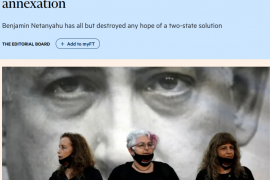David Gardner has been with the Financial Times for over 40 years, was previously their Mid-East editor and is currently their International Affairs Editor. He’s also, based on our coverage of the media outlet, one of their most openly anti-Israel journalists. His latest op-ed (“Equality-for-peace will make Israel accountable for Palestinian rights”, May 4) addresses the recent apartheid smear leveled against Israel by the highly politicised and increasingly biased NGO called “Human Rights Watch”.
After the opening two paragraphs of the op-ed, where Gardner notes the HRW report and provides brief context, he writes the following, suggesting apartheid charges against Israel are gaining momentum:
In January, B’Tselem, flagship of the mostly sunken Israeli peace camp, said that threshold had already been crossed. In the crowded sliver of space between the Jordan River and the Mediterranean, it said that while territory is always contiguous for Jews it is a fragmented mosaic for Palestinians.
First, to describe B’Teselem, which has almost no influence or impact in Israel, and markets most of its reports to foreign audiences, as “flagship” of the Israeli peace camp is misleading. The left-wing, pro-peace, anti-occupation political party Meretz, for instance, at least has six seats in the Knesset. More importantly, as CAMERA demonsrated, the B’Tselem report in question was full of distortions, half-truths and lies. It also rested on the bizarre argument that there’s one Israeli regime from the river to the sea, that Jerusalem “rules” Gaza, and that the failure to grant Gazans, including, presumably, Hamas terrorists, the same rights bestowed to Israeli citizens represents racism.
The HRW report echoes B’Tselem’s ‘one regime from the river to the sea’ idea – a propagandistic, counter-factual framing that the FT’s Gardner seems to put credence in.
Gardner continues:
Anyone who can read a map knows this. Successive governments have relentlessly driven Jewish settlement of the West Bank and carved it into discontiguous Palestinian cantons. The biggest single expansion in settler numbers — by 50 per cent in 1994-96 — was not under the irredentist governments led by Benjamin Netanyahu, the current, five-term prime minister, but under Labour led by Rabin and Shimon Peres at the high watermark of the Oslo peace process, which offered land-for-peace and the vision of an eventual Palestinian state living alongside Israel. That proved a mirage.
Gardner, as is typical for foreign journalists covering the conflict, fails to acknowledge that a contiguous Palestinian state was offered by Israeli leaders on several occasions, only to be rejected by Palestinian leaders. The reason the land-for-peace vision turned out to be a “mirage” is due to Palestinian rejectionism, as well as the 2nd Intifada, launched after Ehud Barak’s offer of statehood, which traumatised a generation of Israelis, soured them on Oslo and convinced many to be distrustful of Palestinian intentions.
Later in his op-ed, Gardner makes the following point:
Netanyahu, while promising to annex roughly a third of the West Bank (Israel annexed Arab East Jerusalem in 1967), has pursued a more cautious policy of incremental dispossession of the Palestinians. That, and ex-president Donald Trump’s “deal of the century”, a glorified real estate deal greenlighting an Israeli land-grab, have realistically made a viable Palestinian state impossible.
The word “dispossession” (the action of depriving someone of land, property, or other possessions) to characterise settlement construction is misnomer, as it falsely suggests a zero-sum game, whereby every new Israeli home built across the green line deprives Palestinians of territory.
This isn’t true.
Though the Israeli population in the West Bank continues to grow (though, more recently, at a much slower pace than in previous years), so has the Palestinian population. As Shany Mor showed, the demographic balance between Israelis and Palestinians hasn’t changed very much since Oslo (with the Israeli population of the West Bank accounting for between 12 and 15 percent of the total population). Further, the amount of West Bank land built up in settlements also hasn’t change very much either, remaining between 1.5 percent and 2 percent. Also, as the overwhelming majority of new settlement construction takes place within existing major settlement blocs (in Area C, most of which would remain under Israeli control in any peace deal), the narrative suggesting that all settlement construction is an impediment to peace is unfounded.
Gardner’s deceptions continue:
Israel has held four inconclusive elections in the past two years, which managed to ignore the Palestinian issue, except when Netanyahu resorted to strident anti-Arab rhetoric and asserted that Israel belongs only to the Jewish people — an anti-democratic dogma passed into law in 2018.
Gardner is referring to the Nation State Law, contrary to his flippant accusation, is not “anti-democratic”. As we’ve demonstrated previously, the Jewish Nation-State Law merely codifies, within the country’s Basic Law (a de facto constitution), Israel as the nation-state of the Jewish people – a principle which is the core of Zionism. We challenged Gardner to cite one political right enjoyed by non-Jewish citizens before the law that they no longer have after the law was passed. As even the head of the left-wing Israeli Democracy Institute conceded, the impact of the law is “largely symbolic”.
The op-ed continues:
Although the population of Jews and Arabs between the Jordan river and the sea is roughly equal at about 6.8m each, this means there are three classes of citizens: Israeli Jews, Israeli Arabs (about 20 per cent of Israel’s population) and Palestinians under occupation.
Gardner uncritically accepts the B’Tselem and HRW framing of ‘one regime between the river and the sea’, a supremely dishonest formulation which repeats the NGOs lie that Israeli leaders, and not Hamas, controls Gaza, and reinforces the accusation that Israel is guilty of an apartheid-like policy. Additionally, his rhetoric falsely suggests that Arab citizens of Israel are second-class citizens – a popular talking point of the anti-Israel left with no connection to reality.
Gardner proceeds:
Many states fear further spread of the irredentism virus in countries such as Russia and China, Turkey and India, which like Israel are seeking to stretch beyond their recognised borders.
The charge of “irredentism” – a policy of advocating the restoration to a country of any territory formerly belonging to it – needs to put in perspective, particularly since Gardner compared Israel to Russia, China, Turkey and India.
Russia has 17.13 million square km of land. China has 9.597 million km. India has 3.287 million km. And, Turkey has 783,562 square km.
Israel has 22,145 square km – representing a meager 0.2 percent of the landmass of the Arab world. The entire West Bank – only a third of which was designated to Israel by the Peace to Prosperity Peace Plan – is 5,628 square km. To compare Israeli ‘expansionism’ (that is, Israeli claims over disputed territory) in the same political universe as that of Russia, China, Turkey and India is grossly misleading.
Gardner ends by noting, hopefully and in the context of the HRW report, that “the price for Israel disdaining [Palestinian] rights…may be rising”.
So, what did Gardner write about Palestinian political responsibilities and moral obligations in the context of the quest for peace? Nothing. Absolutely nothing. As is almost always the case with such pieces, Gardner completely robbed Palestinians of their agency, casting them as passive victims of Israeli malevolence. Decades of bad Palestinian decisions, particularly their choice to pursue violence and embrace antisemitism, was erased by the Financial Times editor.
Forget about the ‘bigotry of LOW expectations’, Gardner appears to have NO expectations of Palestinians or their leaders.
Finally, these passages, from recent essay by Matti Friedman titled ‘Eight tips for reading about Israel”, seem particularly relevant in reading Gardner’s column:
What makes sorting journalists from activists more and more difficult is that many journalists have become activists — that is, they see their job not as helping you understand events, but as pushing you toward their conclusions. They engineer their reporting to that end. Many Western reporters here in Israel, supported by the world of activist NGOs and international organizations (which is the same social and professional world inhabited by reporters, with much movement between them), believe that Israel is the problem. It follows, if you’re an activist, that what’s needed is not an understanding of Israel’s concerns, but a character assassination that will stoke anger and punish the guilty party. The goal is less to inform than to enrage.
As soon as the press becomes activist, it becomes impossible to understand what’s going on. Anyone hoping to understand should be looking for knowledgeable observers capable of understanding different points of view.
Let’s remember that Gardner isn’t merely an op-ed contributor – but the international editor of an extremely influential media outlet. Yet, he promoted an attack on Israel by an activist NGO that didn’t merely accuse Israel of racism, but suggested – in, to cite one example, their attack on the Law of Return – that the problem isn’t with Israeli policy, but with the very idea of a Jewish state.
Despite his decades of experience as a journalist, this piece (and others we’ve posted on) demonstrates that, at least on the Israeli-Palestinian debate, he’s indistinguishable from an activist – one determined (again quoting Friedman) to presents Israel “as a potent symbol of what a right-thinking person is meant to be active against”. Those who wish to understand what’s really going on the region in all it’s moral messiness and historical complexity – one that’s free of the facile Manichean framing fancied by SJWs, Critical Theorists and activist journalists – clearly need to look elsewhere.






Gardner, and the FT which employs him, clearly have, for some reason, an anti-Israeli agenda unlike any negative views about any other country.
It would be interesting to try and find out why this is. Some personal grievance must lie behind this excessive and obsessive agenda.
This was quite amusing:
“B’Tselem, flagship of the mostly sunken Israeli peace camp”
And who, exactly , sunk it?
Perhaps there’s something about incessant terrorist attacks, rocket and mortar firings into civilian area, that most Israelis find a little upsetting and finally had enough of those Palestinian empathizing nutcases and their refusal to accept that the Palestinians are actually Israel’s enemies constantly trying to kill Israelis and hoping to take over the entire country?